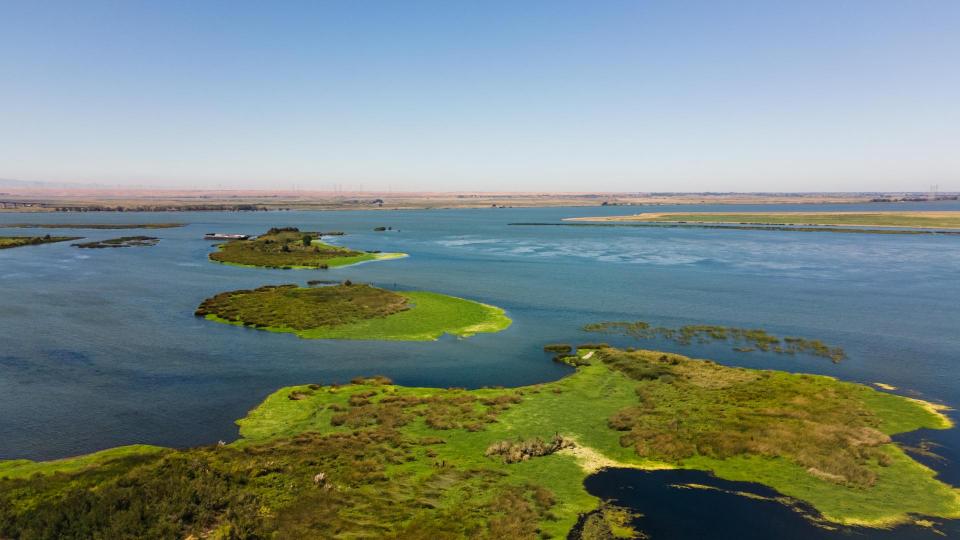Zone 7 Board to Consider Continued Funding and Participation in the Planning Phase of the Delta Conveyance Project at the April 20th Board Meeting
Livermore, CA (April 13, 2022) — On April 20, at the regular board meeting, the Zone 7 Board of Directors will consider continued participation in the four-year planning phase of Delta Conveyance Project (DCP) — a project designed to improve the water delivery system of the State Water Project. The Tri-Valley area, served by Zone 7, a State Water Project contractor, receives approximately 70% of its water through the Delta. Approval of this funding request would continue the work towards the final environmental documents and permits, with Zone 7’s potential total share of the funding estimated at $4.75M for 2023 and 2024, 2.2% of the cost over that period.
On November 18, 2020, the Board approved the first two years of the planning phase, with Zone 7’s share of environmental planning costs at $2.8M for 2021 and 2022. The Board will now consider funding the remaining two years.
At the March 16th regular board meeting, the Executive Director of the Delta Conveyance Design and Construction Authority (DCA) — the Joint Powers Authority tasked with supporting the design, development, and implementation of the DCP — gave an update on the DCP’s progress and upcoming work through the end of the year and plans for the next two-year phase ending in December 2024. The DCP is currently on track with the plans presented to the Board in November 2020.
The California Department of Water Resources (DWR) is in the process of completing the draft Environmental Impact Report (EIR) that is considering a reasonable range of project alternatives that avoid or substantially reduce potentially significant impacts of the DCP. DWR expects to release the draft EIR for public review in mid-2022 and plans to have a final EIR completed in 2023, with other environmental review, permitting and regulatory processes being completed in 2024. Once the DCP receives all necessary approvals and permits and has complied with all legal requirements, detailed design and construction could begin.
Continued participation by Zone 7 in the planning costs will allow Zone 7 to elect to participate in the DCP in the future based on information developed in the planning process, will allow access to information related to benefits and costs, and will provide Zone 7 influence throughout the process. Approval of this phase allows the Zone 7 to remain a part of the planning process and provide input but does not require the Zone 7 to commit to the final project. At such time when full participation is up for consideration, the community would be engaged, and the decision would come to the Board, with the results of the environmental planning process informing such decision.
Upon the conclusion of California Environmental Quality Act (CEQA) review and with a fully defined project — water agencies like Zone 7 that have participated in the planning process would have the option to approve the contract amendment and participate in the DCP. However, contractors that have not participated in the planning process will not have the opportunity to join the DCP.
State Water Project water, carryover water, water stored in Kern County and transfer water all come through the Delta, making the dependability of the Delta infrastructure of critical importance to water supply reliability for the Tri-Valley community.
Zone 7 has been participating throughout the various efforts to address Delta conveyance, which have evolved considerably over the last decade. The DCP would support the Agency’s mission to deliver safe, reliable, efficient, and sustainable water to the residents of the Tri-Valley. In addition to the primary benefit of increased reliability through alternative Delta conveyance, the DCP could also provide benefits in water supply and water quality.
Delta conveyance is the movement of water through the network of waterways in the Sacramento-San Joaquin Delta, the hub of the State Water Project – California’s most critical water delivery infrastructure. Two-thirds of California’s water begins its journey as snowmelt from high in the Sierra Nevada, eventually flowing into the Delta where the State Water Project infrastructure conveys the water to 27 million Californians and 750,000 acres of farmland from the Tri-Valley down to San Diego.
The State Water Project’s 1960-era infrastructure is aging and needs to be upgraded to meet the challenges ahead. As seen in recent years, the state’s precipitation is increasingly coming in the form of big storms between extended dry periods. The State Water Project infrastructure can be improved to be more resilient to climate change and more flexible in its ability to take advantage of big storms by moving water when it’s available without harming threatened and endangered species.
Delta conveyance is also threatened by various factors such as ecosystem considerations, seismic risk, and sea level rise. The DCP would add new conveyance facilities in the Delta, including two new intakes located farther north, away from sensitive fish habitat and 20 feet above sea level. The proposed DCP will likely increase SWP reliability and improve water quality, but a more reliable alternate conveyance system for the majority of Zone 7’s water is the most significant benefit.

